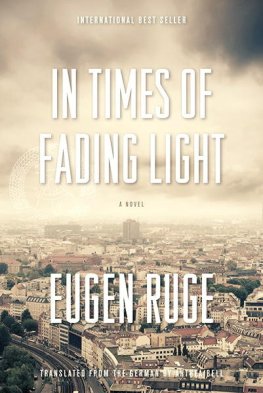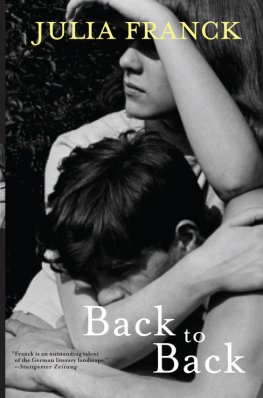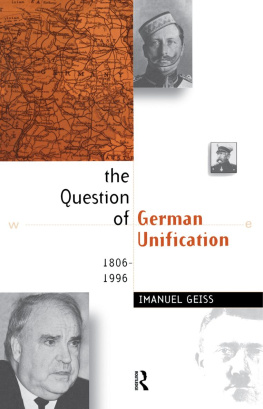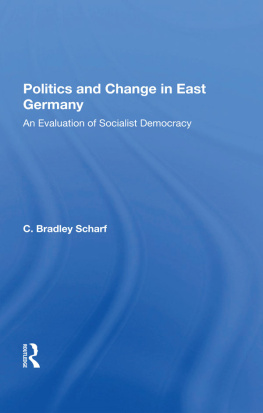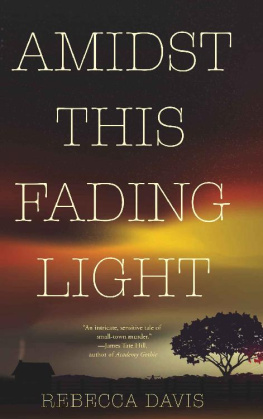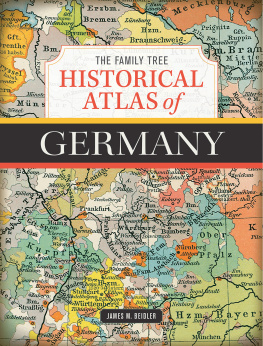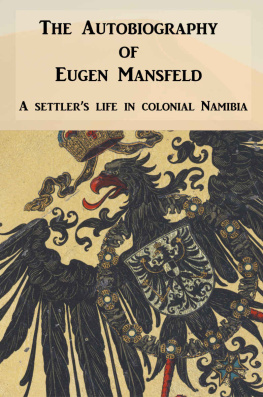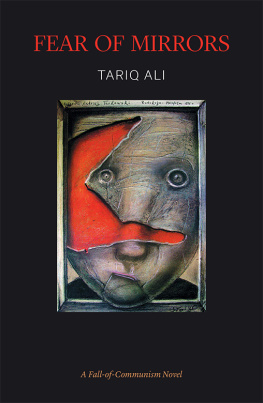Eugen Ruge
IN TIMES OF FADING LIGHT
The Story of a Family
Translated from the German by Anthea Bell
Wilhelm and Charlotte Powileit
(Charlotte Umnitzer by her first marriage)
Werner and Kurt Umnitzer,
her sons
Irina Umnitzer, ne Petrovna,
Kurts wife
Nadyeshda Ivanovna,
Irinas mother
Alexander Umnitzer,
son of Kurt and Irina
Markus Umnitzer,
Alexanders son
He had spent two days lying like the dead on his buffalo leather sofa. Then he stood up, took a long shower to wash away the last traces of hospital atmosphere, and drove to Neuendorf.
As usual, he took the A115. Gazed out at the world, wanted to see if it had changed. Had it?
The cars looked to him cleaner. Cleaner? Kind of more colorful. More idiotic.
The sky was blue, what else?
Fall had insidiously crept up on him behind his back, sprinkling the trees with little dabs of yellow. It was September now. So if they had discharged him on Saturday, this must be Tuesday. Hed lost track of the date over these last few days.
Neuendorf had recently acquired its own expressway exit roadby recently, Alexander still meant since the fall of the Wall. The exit road took you straight to Thlmannstrasse (which still bore the Communist leaders name). The street was smoothly paved, with bicycle lanes on both sides. Renovated apartment blocks, insulated to conform to some EU norm or other. New buildings that looked like indoor swimming pools, called townhouses.
But you had only to turn off to the left and follow the winding Steinweg for a few hundred meters, then turn left againand you were in a road where time seemed to stand still: narrow, lined with linden trees, sidewalks paved with cobblestones, with bumps and dents where tree roots had risen. Rotting fences swarming with firebugs. Far back in the gardens, behind tall grass, were the uncurtained windows of villas that at present, in attorneys offices far away, were the subject of legal dispute over the return of such properties to their original owners.
One of the few buildings still inhabited here was number 7 Am Fuchsbau. Moss on the roof. Cracks in the facade. Elder bushes already crowding in on the veranda. And the apple tree that Kurt always used to prune with his own hands now rose to the sky at its own sweet will, its branches tangled in wild confusion.
Todays Meals on Wheels offering stood in its insulated packaging on the fencepost. He checked the date on it; yes, Tuesday. Alexander picked it up and went on.
Although he had a key, he rang the bell to see whether Kurt would answer the door. Pointlessanyway, he knew that Kurt would not answer the door. But then he heard the familiar squeal of the door into the corridor, and when he looked through the little window Kurt appeared, ghostlike, in the dim light of the small front room just inside the entrance.
Open the door, called Alexander.
Kurt came closer, gawping.
Open the door!
But Kurt didnt move.
Alexander unlocked the door and hugged his father, although hugging him had been less than pleasant for some time. Kurt was smelly. It was the smell of old age, and it had sunk deep into his pores. Kurt was still smelly even when he had been washed and his teeth were brushed.
Do you know who I am? asked Alexander.
Yes, said Kurt.
His mouth was smeared with plum jam; the morning home health aide had been in a hurry again. His cardigan was buttoned the wrong way, and he was wearing only one slipper.
Alexander heated up Kurts meal. Microwave, safety catch switched on. Kurt stood there, watching with interest.
Hungry? asked Alexander.
Yes, said Kurt.
Youre always hungry.
Yes, said Kurt.
There was goulash with red cabbage (since the time when Kurt nearly choked to death on a piece of beef, the Meals on Wheels service had been asked to send meat only cut up small). Alexander made himself coffee. Then he took Kurts goulash out of the microwave, put it on the plastic tablecloth.
Bon appetit.
Yes, said Kurt.
He began to eat. For a while there was no sound apart from Kurt snuffling as he concentrated. Alexander sipped his coffee, which was still far too hot. Watched Kurt eating.
Youre holding your fork upside down, he said after a while.
Kurt stopped eating for a moment, seemed to be thinking. But then he went on; tried to push a piece of meat from the goulash on to the end of his knife with the fork handle.
Youre holding your fork upside down, Alexander repeated.
He spoke without emphasis, without any undertone of reproof, to test the effect of the mere statement on Kurt. None at all. Zero. What was going on inside that head? A space separated from the world by a skull, and still containing some kind of ego. What was Kurt feeling, what was he thinking when he picked his way around the room? When he sat at his desk in the morning and, so the women home health aides said, stared at the newspaper for hours on end? What was he thinking? Did he think at all? How did you think without words?
Kurt had finally shoved the piece of meat from the goulash onto the tip of his knife and, quivering with greed, was raising it to his mouth. A balancing act. It fell off. Second try.
What a joke, come to think of it, reflected Alexander. To think that Kurts decline had began, of all things, with language. Kurt the orator. The great storyteller. How he used to sit there in his famous armchairKurts armchair! How all and sundry would hang on his lips as Kurt the professor told his little stories. His anecdotes. And another funny thing: in Kurts mouth everything became an anecdote. Never mind what Kurt was talking abouteven if he was telling you how he nearly died in the campit always had a punch line, it was always witty. Well, used to be witty. In the distant past. The last consecutive sentence that Kurt had managed to utter was: Ive lost my powers of speech. Not bad. Brilliant, compared with his present repertory. But that was two years ago. Ive lost my powers of speech. And people had genuinely thought, well, hes lost his powers of speech, but otherwise Otherwise he still seemed to be, at least to a certain extent, all there. Smiled, nodded. Made faces that somehow fitted the context. Put up a clever pretense. But just occasionally he did something odd, poured red wine into his coffee cup. Or stood around holding a cork, suddenly at a lossand then put the cork away on a bookshelf.
Todays quota so far was pathetic; Kurt had managed only one piece of meat from the goulash. Now he was using his fingers as he wolfed it down. Looked surreptitiously up at Alexander, like a child testing his parents reaction. Shoved goulash into his mouth. And more goulash. And chewed.
As he chewed, he held up his fingers, covered with the sauce, as if taking an oath.
If you only knew, said Alexander.
Kurt did not react. He had finally found a method: the solution to the goulash problem. Stuffed it in, chewed it. The sauce ran down his chin in a narrow trail.
Kurt couldnt do anything these days. Couldnt talk, couldnt brush his own teeth. Couldnt even wipe his bottom; you were lucky if he sat on the toilet to shit. The one thing that Kurt could still do, thought Alexander, the one thing he still did of his own accord, the one thing that really interested him, and to which he put the very last of his clever mind, was eating. Taking in nourishment. Kurt didnt eat with relish. Kurt didnt even eat because he liked the taste of his food (his taste buds, Alexander felt sure, had been ruined by decades of pipe smoking). Kurt ate to live. Eating = Life, it was an equation, thought Alexander, that he had learned in the labor camp, and he had learned it thoroughly. Once and for all. The greed with which Kurt ate, stuffing goulash into his mouth, was nothing but the will to survive. All that was left of Kurt. It was what kept his head above water, made his body go on functioning, a heart and circulation machine that had slipped out of gear but still kept workingand would probably, it was to be feared, keep working for some time yet. Kurt had survived them all. He had survived Irina, and now there was a very real chance that he would also survive him, Alexander.

